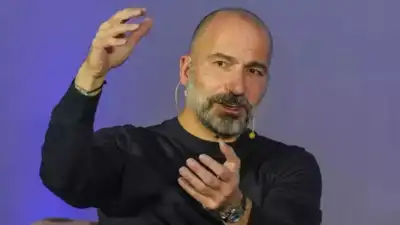ARTICLE AD BOX

Uber CEO Dara Khosrowshahi
has claimed
Rapido
as the US-based ride-hailing giant’s biggest competitor in the Indian market. Khosrowshahi stated that while Ola used to be their main rival, Rapido now holds that position. In a recently released podcast with online brokerage company Zerodha’s co-founder Nikhil Kamath, Khosrowshahi said, “Ola used to be our main competition. I'd say now the tougher competition in India is Rapido. They got into two-wheelers and three-wheelers really aggressively with a zero-commission subscription model. Very scrappy as well. Ola is now kind of a distant third.” He also highlighted India's importance for growth, calling it a "must-win" market for the company both now and in the coming days. With over 1.4 million drivers, including autos, two-wheelers, three-wheelers and cars, India has become Uber's third-largest market globally in terms of total trips. "India is a must-win for Uber, not just tomorrow, but ten years from now," Khosrowshahi added.
Uber CEO explains how Rapido achieved this feat
While explaining Rapido's success, Khosrowshahi said its subscription model helped drivers keep more of their earnings, which gave it early traction. However, he pointed out that Rapido was "not making money" and would face the challenge of proving it can grow profitably.
“We've got a lot of respect for them and we intend to compete really hard,” he noted.The Uber chief also shared his views on the wider quick commerce and
mobility sector
, suggesting that entrepreneurs should avoid overanalysing market size.“Businesses that succeed are always adapting. If there's a product market fit in a narrow segment, build there and expand step by step. Total addressable markets are for fundraising decks, not for building businesses,” he added. Khosrowshahi, who earlier led Expedia, also said Uber views itself as a "local operating system" for daily life, covering rides, food, groceries, and retail delivery.When asked about exiting Zomato, he said, “We're not an investment company. My competency is to build operating businesses and grow them over time.” In 2020, the Indian division of Uber Eats was acquired by Zomato in a deal that gave Uber a stake in the food delivery company, which it later sold.Apart from this, Khosrowshahi also noted that autonomous cars are "inevitable" but could take a long time to become operational in India. “Drivers of autonomous cars are safer, but much more expensive, even in developed markets. For autonomous cars to come into India, it's going to take a long time. I think we're looking at a 20-year horizon," he noted.He even described his leadership style as collaborative, with the ability to shift to "wartime decision-making" when needed.“Sometimes collaboration doesn't help. You have to say here's what we're going to do. Because my team sees me listening most of the time, they give me credit when I say we're going this way,” he added.Khosrowshahi also mentioned that even with Uber’s scale, he aims to keep the perspective of a disruptor.“I see our shortcomings much more than our accomplishments. Within these walls, we want to act like a startup. Outside, we have to recognise we are a big company, and that comes with responsibility,” he explained.
Boat Stone Arc Pro+: This Speaker Has it All



.png)
.png)
.png)
















 4 hours ago
3
4 hours ago
3








 English (US) ·
English (US) ·